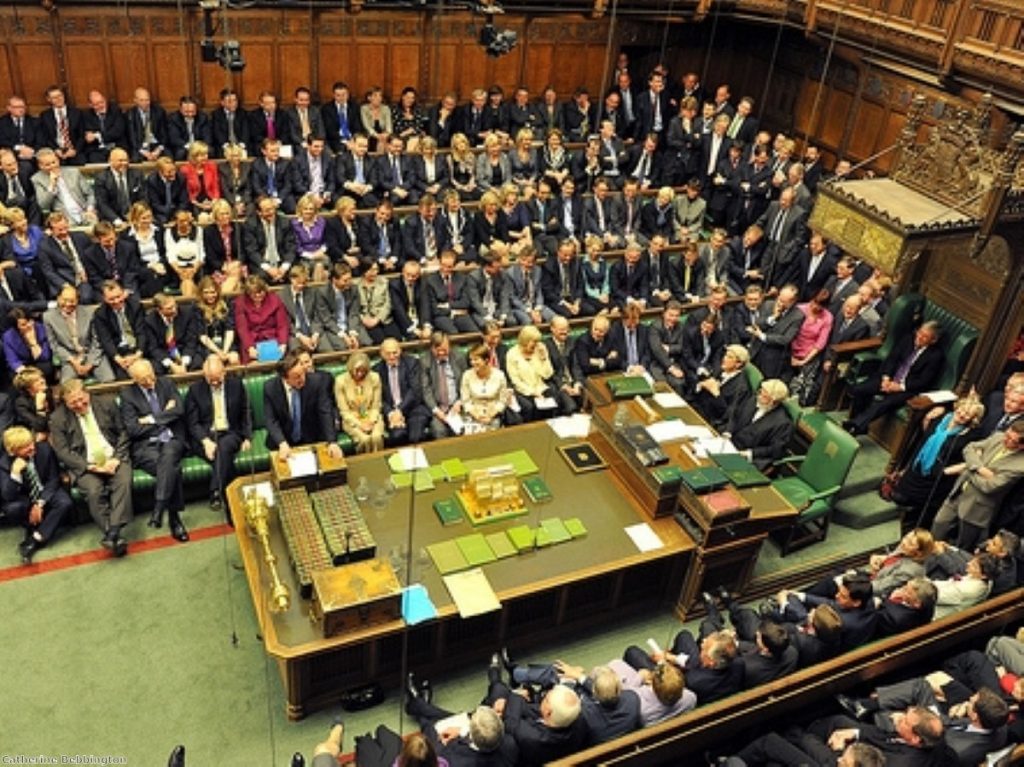PMQs verdict: Cameron and Miliband grinning at the heart of the storm
It was the peak of prime minister's questions, the final devastating attack from the leader of the opposition. He had been building up to this condemnation of the government for all of his six questions, a slow winding-up to the knockout blow on the failure of the coalition's efforts to get the long-term unemployed back into work.
When all of a sudden, David Cameron made an early move to get to his feet. He had mistakenly thought Miliband had finished his question, and was scrambling to get to his feet somewhat prematurely. Given that the prime minister was already on the ropes, it was a mistake. "Calm down, calm down!" Miliband said, giving what has become one of Westminster's most clichéd gestures: the downwards-patting motion of a Michael Winner hushing an irritating wife. Cameron had originally used it against the Labour frontbenchers, so it was OK for Miliband to mock him for it now.
Cameron fell back, shrugging and tapping his watch. He wanted to get on with it, he was saying, as he sat back smiling. Miliband was smiling too; it seemed for a moment as if the two were united in their amusement at this whole preposterous charade. Around them their respective backbenchers yelled and brayed, but the moment seemed to hold. Their eyes locked, Cameron sat back shaking his head, Miliband leaning over the despatch box waiting for the clamour to die down. There they were, grinning at each other like schoolchildren. Their relationship is unique in British public life, and this seemed to be one of the moments when they have more in common than anyone else.
"He just can't keep his cool when knows he's losing the argument," Miliband eventually crowed. The spell was broken. It was time for the performance to continue. To Miliband's right, shadow chancellor Ed Balls gleefully gestured away. If this were a curling match, he would be one of the people with the brooms sweeping away frantically, doing everything they can to extract every last inch of advantage.


Cameron could only come up with the rather random: "I think what we can see is a leadership that's drowning." The truth was that the prime minister had a mixed session. He made some laborious points about Labour's Commons motions which simply got lost in translation, to very little effect. Much better was his response to Miliband's criticism of his Cabinet ministers scrapping in their meeting yesterday. "Rats in a sack" was the phrase Miliband used, but Cameron turned it against him. "He worked in a government where the prime minister and the chancellor couldn't bear to be in the same room as each other," he snarled back. Gordon Brown, as usual, was not present to hear the PM observe: "Rats in a sack doesn't even do it!"
…justice, the prime minister meant to put on the end of that sentence. That was the preoccupation of several Tory backbenchers as they prepare for the Leveson inquiry tomorrow. Philip Davies, a member of the Commons' media committee, warned the PM: "You either have state regulation, or you don't." His intervention just underlined the very difficult challenge facing Cameron in the next 24 hours, as he calculates whether he must defy his backbenchers or his coalition colleagues.
In terms of actual policy, it was the announcement by Miilband that he hopes to see the parties working together on a "cross-party basis" on Leveson that was of the most significance. This may be a ploy by the opposition to encourage the Lib Dems to disagree with their coalition partners tomorrow. But it might just be a genuine attempt to initiate cross-party talks, which could help delay the issue and prevent a dramatic standoff in parliament when Leveson is debated more fully next week. "I hope this House can make it happen," Miliband said optimistically. Even if Cameron went on to lose the exchanges to follow, this was good news for the prime minister. Their odd moment of eye contact will have reminded both they have a lot in common – and can work together when necessary.
Ed Miliband 2 – David Cameron 1

